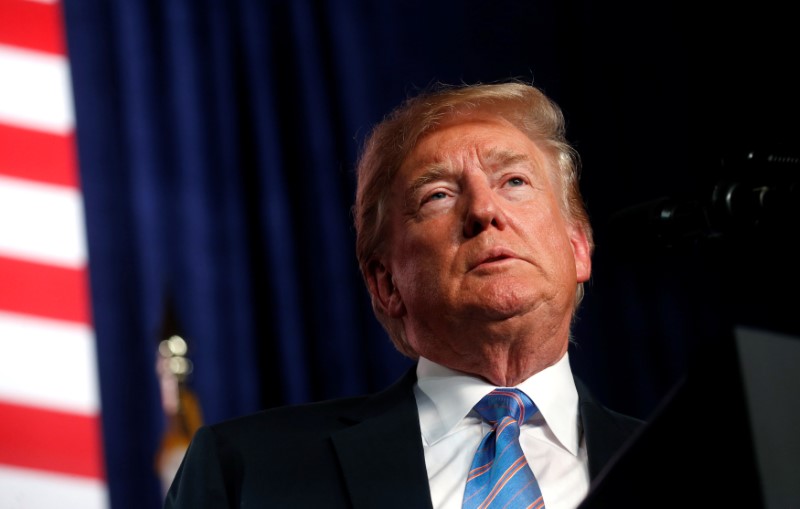 © Reuters. U.S. President Donald Trump delivers remarks at a “Salute to Service” dinner held in honor of the nation’s military at The Greenbrier in White Sulphur Springs, West Virginia, U.S.
© Reuters. U.S. President Donald Trump delivers remarks at a “Salute to Service” dinner held in honor of the nation’s military at The Greenbrier in White Sulphur Springs, West Virginia, U.S.WASHINGTON (Reuters) – U.S. President Donald Trump again accused the Organization of the Petroleum Exporting Countries of driving gasoline prices higher on Wednesday and urged the oil producer group to do more.
“The OPEC Monopoly must remember that gas prices are up & they are doing little to help. If anything, they are driving prices higher as the United States defends many of their members for very little $’s. This must be a two way street. REDUCE PRICING NOW!” Trump wrote on Twitter.
The Republican president has lashed out at OPEC in recent weeks. Rising gasoline prices could create a political headache for Trump before November mid-term congressional elections by offsetting Republican claims that his tax cuts and rollbacks of federal regulations have helped boost the U.S. economy.
In a tweet on Saturday, Trump said Saudi Arabia had agreed to increase oil output by up to 2 million barrels, an assertion that the White House rowed back on in a subsequent statement.
The leader of Saudi Arabia, OPEC’s biggest member, has assured Trump that the kingdom can raise oil production if needed and that the country has 2 million barrels per day of spare capacity that could be deployed to help cool oil prices to compensate for falling output in Venezuela and Iran.
Trump has been complaining about OPEC at the same time that Washington is piling pressure on its European allies to stop buying Iranian oil.
Iranian OPEC Governor Hossein Kazempour Ardebili said on Thursday that Trump had raised oil prices through his tweets.
“Your tweets have increased the prices by at least $10. Please stop this method,” the Iranian oil ministry’s news agency, SHANA, quoted Kazempour as saying.
Kazempour said Trump was trying to intensify tensions between Iran and Saudi Arabia. He also called on the United States to join world powers in a meeting with Iran in Vienna on Friday.
Foreign ministers from the five remaining signatories of a nuclear deal between Tehran and world powers will meet Iranian officials in the Austrian capital to discuss how to keep the accord alive after the U.S. withdrawal from the pact.
Iran has threatened to block oil exports through a key Gulf waterway in retaliation against any hostile U.S. action.
Fusion Media or anyone involved with Fusion Media will not accept any liability for loss or damage as a result of reliance on the information including data, quotes, charts and buy/sell signals contained within this website. Please be fully informed regarding the risks and costs associated with trading the financial markets, it is one of the riskiest investment forms possible.
Source: Investing.com





























